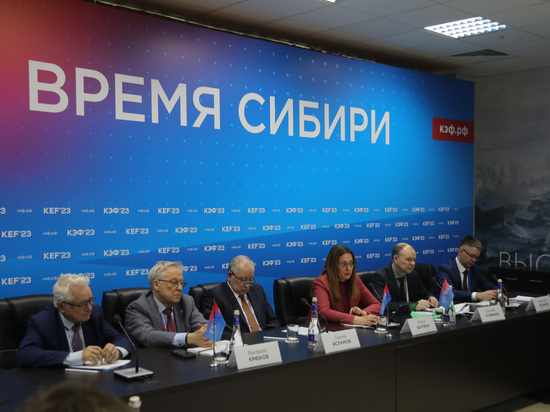Deepening the processing of energy carriers has become one of the hottest topics of the Krasnoyarsk Economic Forum
[ad_1]
The Russian economy is often called a raw-materials economy, and this is logical: our country is one of the richest in the world in terms of mineral resources. Crude oil, gas and lignite are successfully exported to a variety of destinations, with India and China processing the raw materials (coal, oil and gas) they receive from Russia and reselling the finished product, for example in the form of synthetic natural gas, at a good profit to countries Europe. It turns out that even with the most impressive reserves in the world, Russia is losing profits due to the inefficiency of their use. Ways to solve this problem were discussed by experts at one of the key sessions of the Krasnoyarsk Economic Forum.
Participants of the session “Points of growth of Siberia. Prospects for Deepening the Processing of Hydrocarbons in the Region” are convinced that the solution to the problem that has arisen lies on the surface. It is necessary to learn how to use energy carriers as efficiently as possible. Today, Russia has a well-established mechanism for the extraction and sale of oil, gas and coal. Also, minerals are actively used at enterprises and for the personal needs of citizens, however, the potential of energy carriers is much wider – from the deepening of their processing within the country, both the economy and the environment of the Russian Federation will only benefit. And considering that, according to the Constitution, all natural resources belong to the people, the issue of increasing the efficiency of their use falls into the field of interests of every Russian.
Smokeless fuel, superplastic and no ash
The ash and emissions that remain during the processing and transportation of coal cause serious environmental damage. Governor of the Krasnoyarsk Territory Alexander Uss at KEF-23 called to stop the process of coal transportation. There are technologies that turn coal into fuel without ash residue. At the same time, the emission of harmful substances into the air is reduced by 90%. 20% reduction in carbon dioxide emissions. And the transportation of the processed product also frees up overloaded railroad tracks.
“Coal is not a bad dirty fuel, but wrong, outdated technologies for its processing. The need to burn coal emerged back in the 18th and 19th centuries, but today is a different time, different tasks. We are already making Siberian lignite a highly efficient and environmentally friendly fuel,” notes Sergey Islamov, Doctor of Technical Sciences.
When using smokeless fuel, an additional valuable product is formed – gaseous fuel, it can also be used. Competent processing of coal also makes it possible to obtain a sorbent to improve the efficiency of treatment facilities.
Today, with the departure of Western companies, many commodity niches have been vacated for advanced processing products – a movement towards the creation of products with high added value (recycled coal can be used to produce fertilizers, paint, rubber, batteries, and much more). So far, Russia has imported much of what it can produce on its own.
From recent examples: thanks to the deep processing of oil, engineering plastics are produced. They were also used in the construction of engineering communications of the Crimean bridge.
Obvious benefits for the economy
As Sergei Islamov emphasized, in order to establish such processes, companies need investments and large-scale programs for the development of hydrocarbon processing from the state. There is no doubt that such actions will pay off many times over in the future. Experts have calculated that from 4-5 tons of brown coal, 1 ton of smokeless fuel is obtained. And its price is several times higher than the cost of ordinary coal.

Work in this direction is beneficial for the Russian economy and for Russians. Deep processing will kill two birds with one stone – increase the amount of useful raw materials and reduce hazardous waste and greenhouse gas emissions, improving the ecology in cities. The development of efficient coal processing has long been followed, for example, in India and China, where such processing is included in the priorities of the national industrial policy. The time has come for Russia to follow suit.
High export potential of processing
Russian coal is in demand all over the world. Raw materials in our country are many times cleaner than coal in other states. As reported Head of the Department for the Development of the Coal Industry of the Ministry of Energy Petr Bobylevwith the active development of processing programs, Russia will be able to export not only coal, which costs $100-150 per ton, but also coal chemistry, or processed raw materials, at $2,000 per ton.
In addition to coal, there is also a large untapped potential in oil and gas production. According to analysts, in Russia only 1.5% of gas is used as a chemical raw material, while a significant part of the blue fuel is flared at the fields. As a result, we have economic losses. As for oil production, oil flares annually burn as much associated gas as the entire population of our country consumes in a year.
“The deepening of the processing of fossil raw materials in Siberia, including oil, coal and gas, can become a new vector for the development of the country and expand the export potential of the Russian Federation,” she is sure Irina Bakhtina, Chairman of the Ecology, Climate, Environmental Protection Committee of the National ESG Alliance.
At the same time, the Russian Federation has rich experience in efficient processing of raw materials. So, for example, in the aluminum industry, Russian raw materials – nepheline ore and bauxite – are processed at 100%.
Businesses have knowledge, technologies and rich experience, the next step is for the state. The authorities only need to establish a mechanism for applying recycling methods at the state level in order to make inefficient use of minerals a thing of the past.
Gasification of Krasnoyarsk is profitable

In addition to the efficient processing of resources, representatives of government, business and science speaking at the Krasnoyarsk Economic Forum discussed another long-standing problem of Siberia. This is the lack of gasification of Krasnoyarsk. Today, this strategically important region for the economy is cut off from the country’s gas pipelines.
Paradoxically, Siberia is one of the cheapest gas producers in the world, and Krasnoyarsk is still heated by coal. The forum experts called for accelerating the gasification of the region, as well as forming a new gas transportation system in the region.
Siberian natural gas contains propane, methane, butane, heavy hydrocarbons and expensive helium, the largest reserves of which are concentrated in Eastern Siberia and the Far East. This means the need to create gas processing capacities in the regions to produce these valuable components. As a result of processing, dry gas is also released, which can be used, for example, in the gasification of private households. According to analysts, in aggregate, such measures will be able to attract up to three trillion rubles of investments by 2050.
[ad_2]
Source link






